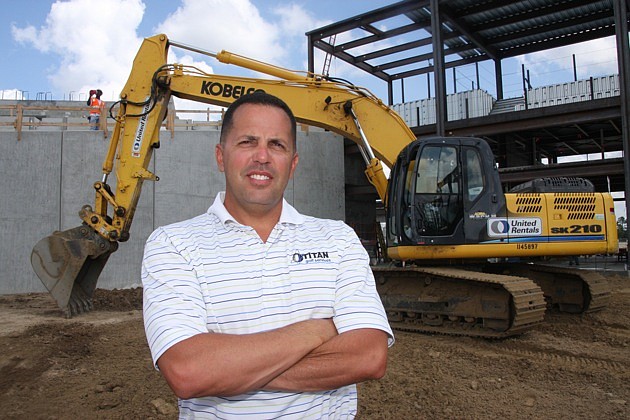A drunk driver cut short Brad Moretti's professional golf career. The head-on collision in Fort Myers in 1991 was so violent that Moretti's leg was broken, his ankle was shattered and his left eyeball popped out of his smashed face.
But Moretti's love of the game didn't falter, even as he recovered from injuries that wrecked his dream. In 1992, a year after the accident, he helped build an executive golf course in Punta Gorda called Emu Lakes and ran it for seven years, doing everything from mowing the grass to running the pro shop.
Eventually, Moretti oversaw golf-course construction and maintenance for WCI Communities, the Bonita Springs-based residential development company, from 2001 to 2004.
Moretti, 46, who spent five years in the U.S. Marine Corps after high school, started Titan Construction Services in 2004, building golf courses for homebuilders such as Colonial and Meritage. “I built off my relationships,” Moretti explains.
Over the years, Moretti has developed a keen understanding of how to develop a site so Florida's infamous summer downpours don't turn it into a swamp. He's gotten so good at it that he is building the seven baseball fields at the new Red Sox spring training stadium to open next year in Lee County.
“That field will handle a hurricane, and you can play on it the next day,” Moretti says. Moretti's business partner, Josh Ford, oversees the projects in the field while Moretti seeks business and handles the firm's finances.
The Red Sox stadium complex, designed by architecture firm Populous, consists of seven ball fields. For Titan, it's a $2.6 million project and a feather in its cap that might lead to other big-league work.
The key to building a playing field that stays dry, of course, is to make sure it drains properly. To do that, for example, Titan crews use lasers to measure grades to a quarter inch. Each laser-grading setup costs $40,000.
While Titan started building golf courses in the company's early years, Moretti says he gradually realized in 2007 that residential development was coming to a halt as the recession began. Meanwhile, municipalities and schools discovered that renting out athletic fields for tournaments is a moneymaker.
Compared with golf courses, ball fields are relatively easier to build. However, the challenge with building athletic fields is that you have to work with municipalities and have bond insurance.
Until the recession hit, Moretti had been used to working with private developers. Besides golf courses, Titan also did site development work for companies such as Benderson Development, clearing land for commercial centers. One noteworthy project was clearing the land for the giant Bridgestone/Firestone distribution center in Jacksonville.
Revenues rose to about $6 million last year, up from $4 million in 2009. Still, that's down from the $13 million to $15 million in revenues during the boom years.
Moretti acknowledges he's concerned that municipalities are cutting back on recreational facilities, but that's tempered by the fact that well-built athletic fields that drain easily can be moneymakers. Youth athletic tournaments are big business, filling nearby hotel rooms and restaurants.
“Through the end of this year, we're OK,” Moretti says. “I'm busy every day bidding jobs for this fall.”
If municipal work slows, Moretti hopes private development picks up. He's heard that engineering firms are starting to see an increase in work, a positive leading indicator. “I want to be in Fort Myers and Naples when it comes back,” he says.






